|
Maidstone Road / The Square / Warren Street
Lenham
01622 858531
http://www.redlionlenham.co.uk/
https://whatpub.com/red-lion
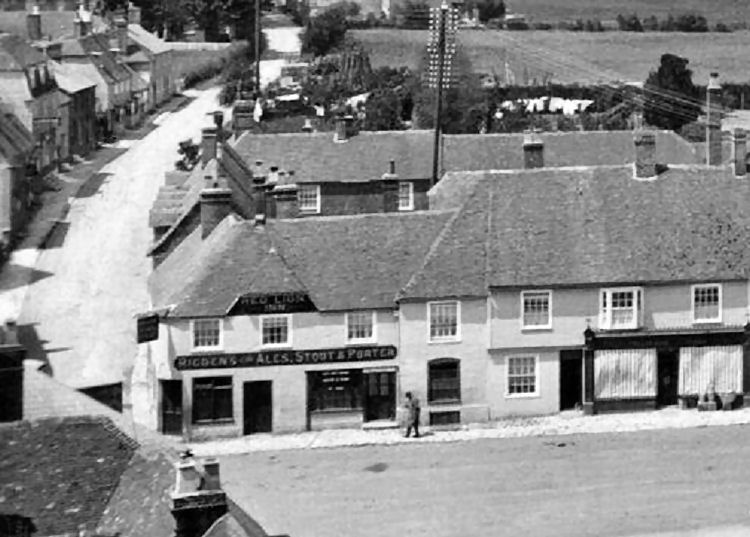
Above photo circa 1911, kindly sent by Rory Kehoe. |
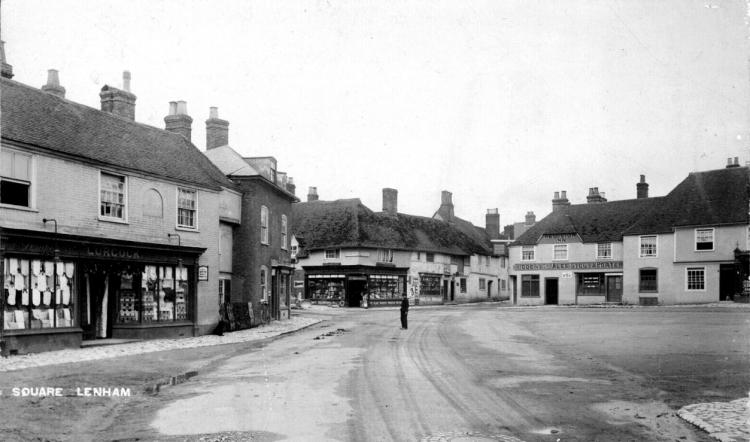
Above postcard, circa 1912, kindly sent by Rory Kehoe. |
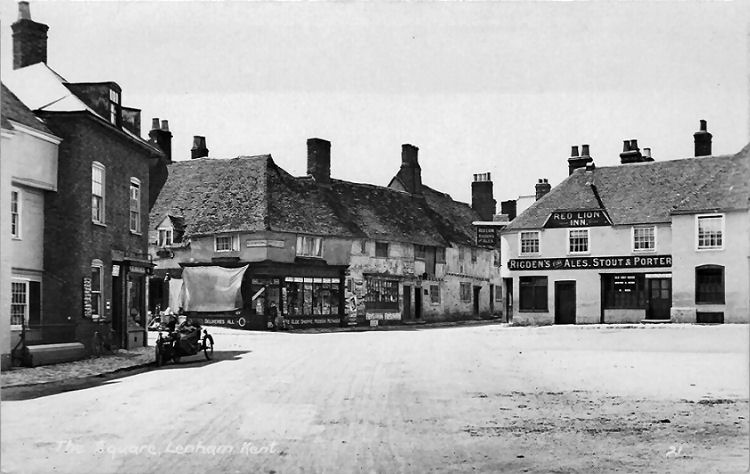
Above photo, circa 1930, with permission from Eric Hartland. |
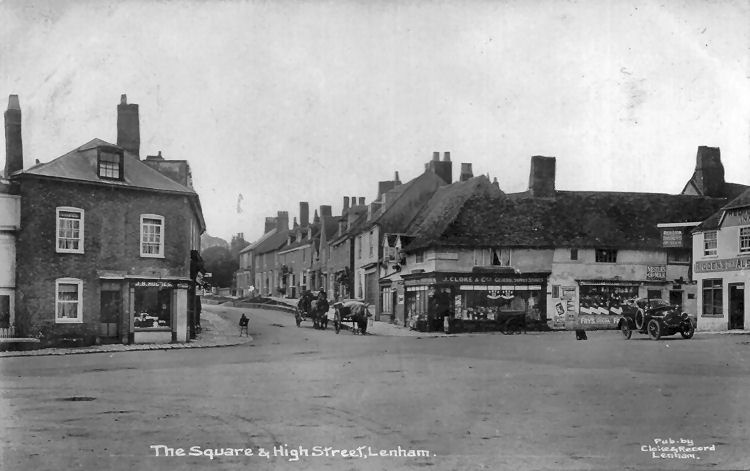
Above postcard, date unknown, kindly sent by Mark Jennings. |
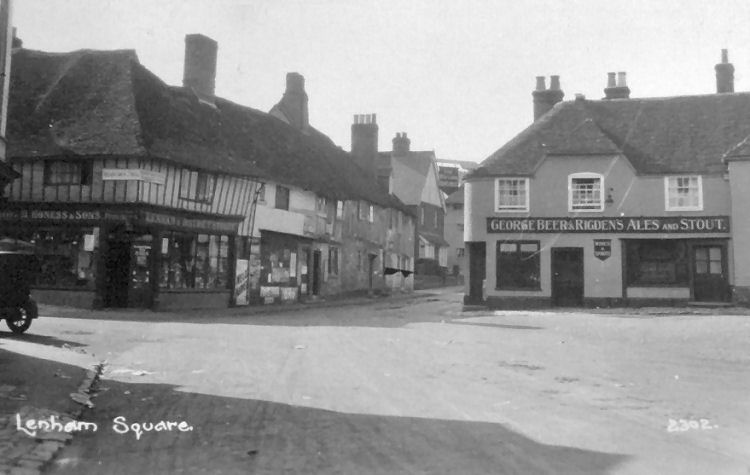
Above postcard, circa 1931, kindly sent by Rory Kehoe. |
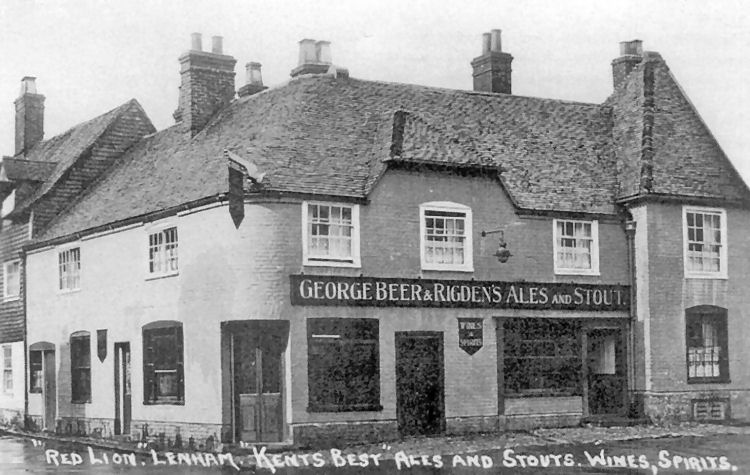
Above postcard, circa 1932, kindly sent by Ray Newman. This
photograph was taken, almost certainly with a view to the image being
used on publicity postcards. This may have coincided with a change of
licensee, as long-serving host, George Chambers, would have been
retiring in the early 1930s. As the signage clearly declares, the pub
was a tied house, within the estate of George Beer & Rigden's Faversham
Brewery. |
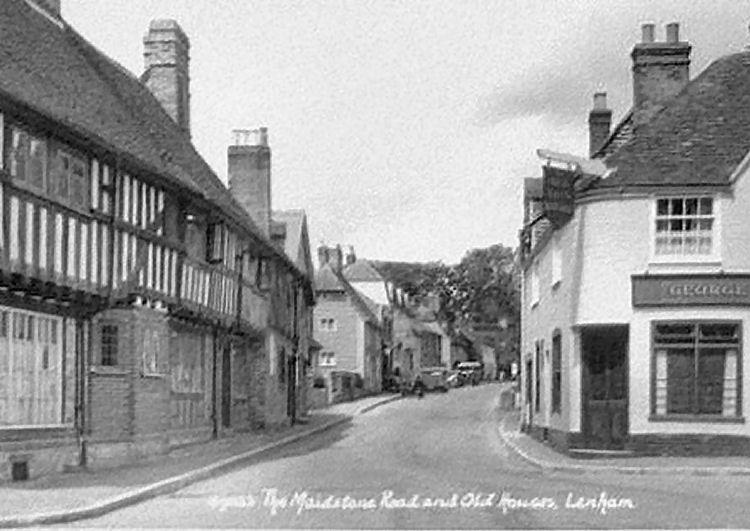
Above postcard, date unknown. |
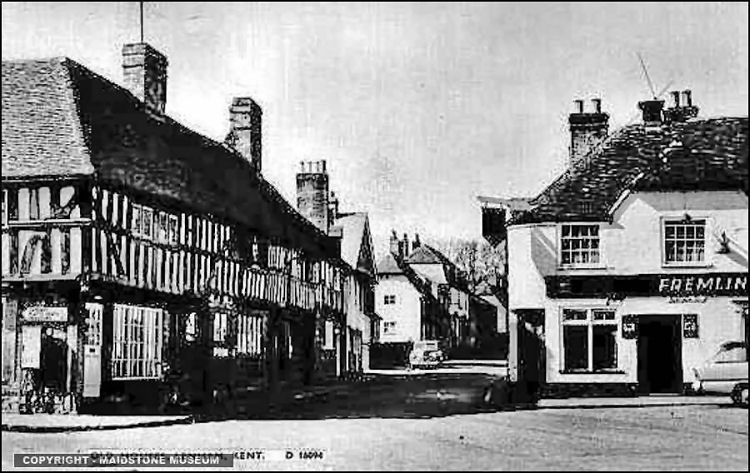
Above photo, 1960, with permission from Eric Hartland. |
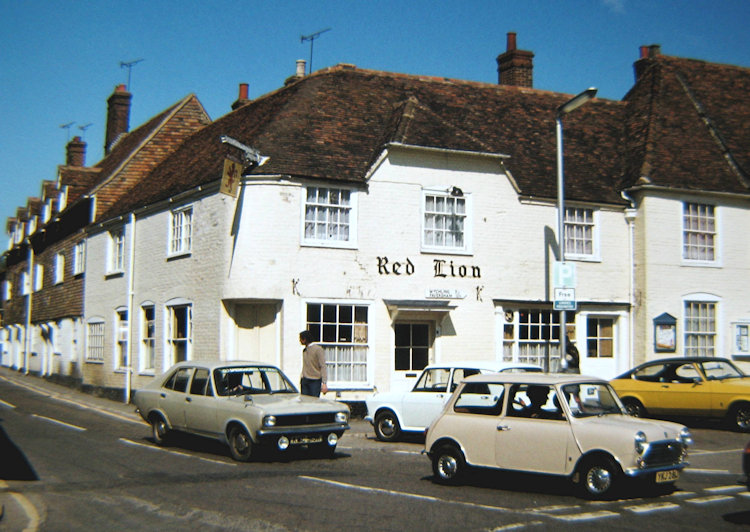
Above photo, 18 April 1981, by Jim Ashby. |
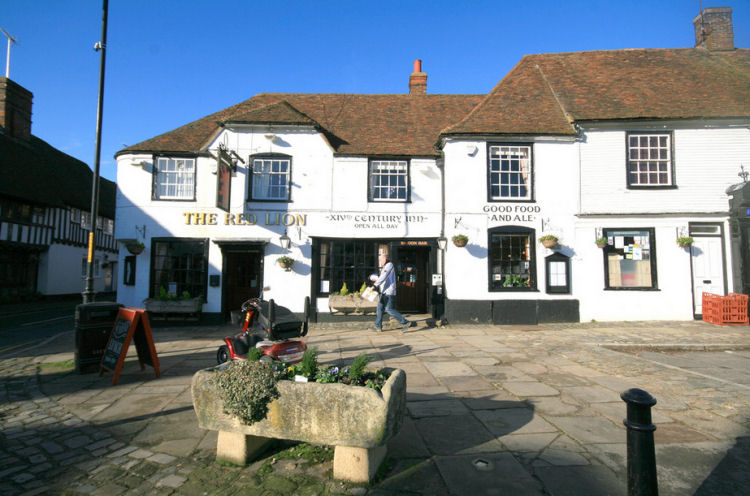
Photo taken 16 January 2011 from http://www.flickr.com Jelltex. |
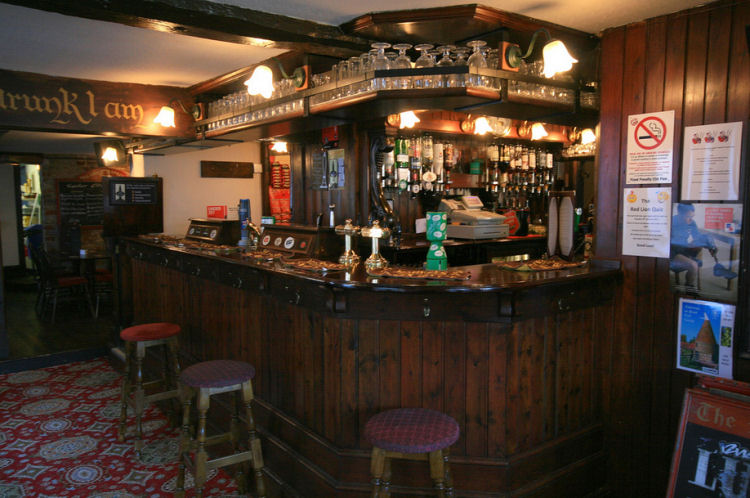
Photo taken 16 January 2011 from
http://www.flickr.com
Jelltex. |
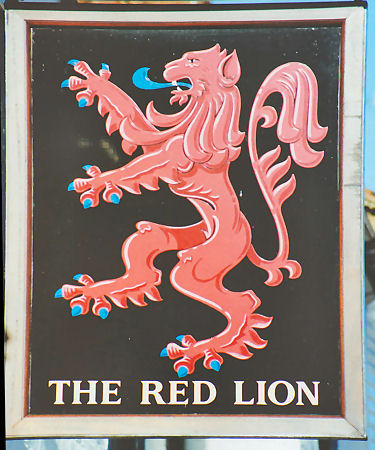 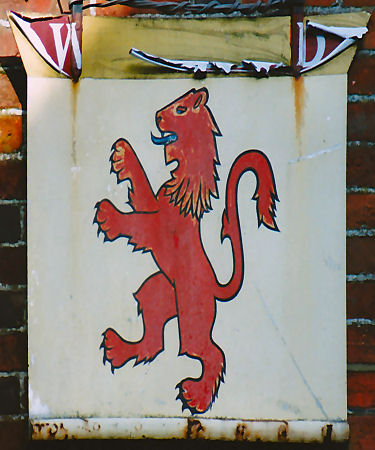
Above signs, February 1995.
With thanks from Brian Curtis
www.innsignsociety.com. |
|
Maidstone Journal and Kentish Advertiser, Tuesday 14 November 1843.
Lenham Agricultural Association.
The annual ploughing match of this association took place on Friday
last, in a field belonging to Mr. W. Powell of East Lenham. A list of
the prizes described on the occasion will be found at our advertising
columns.
The dinner took place at the "Lion Inn," Sir Edmunds Filnest, Bart., M.P.
in the chair.
We very much regret being compelled to postpone our report of the
proceedings, together with remarks, on the ploughing till our next.
|
|
Kentish Gazette, 19 March 1844.
DEATH.
March 11, at Lenhnm, Mrs, Judith Bigg, aged 60, widow of Mr. R. Bigg,
many years landlord of the "Lion Inn," Lenham.
|
|
Canterbury Journal 15 March 1856.
Assizes, Nisi Prius Court, Tuesday, before Baron Alderson.
Wallis v Payne.
Mr. Lush, for the plaintiff, said the action was brought to recover
damages for an assault. Plaintiff pleaded that defendant was in his
house, and she desired to have some liquor, but, as he refused to
serve her, and she declined to go, he put her out without any more
force than was necessary.
Mary Ann Wallis, the plaintiff, wife of John Wallis, who keeps a
public house at Folkestone, ("North
Foreland") said:- The defendant keeps a public
house in Warren Street, Lenham.
("Red Lion.") Defendant married her mother. On the
8th Nov., 1854, she went to defendant’s house to see her mother. A
young woman, Mary Hughes, went with her. She called defendant by his
name, and asked him if her mother was there. He said “She is in, I
believe.” She went through the tap-room into the wash-house to find
her. Defendant was sitting in the tap-room. She found her mother in
the wash-house, and came back with her, and was going to the
parlour, which was close to the tap-room, across a passage. When her
mother and her were going into the parlour, defendant struck her in
the chest and knocked her against the wall, and then hit her on the
side of the head, and knocked in the side of her bonnet. She went
into the parlour and sat down. He called her a vulgar name, and then
he struck her while she was sitting, and said he would send for a
constable to put her out, as she had no business there. She told him
she came civilly, to see her mother. He said no such ---- “varmint”
like her had any business there. She sent for her son, to protect
her. He came to the house, and she left with him.
By Mr. Chambers: She went home then to Folkestone. Her son drove her
to Ashford; thence she went by rail. Defendant would not allow her
mother to give her anything, so she could not tell if her son had
anything when he came. She had seen her mother that morning before,
at her sister’s, and had been in her company for half an hour. She
knew that defendant had kept her mother without food for three or
four days. Some months after the marriage, in 1854, they began to
quarrel. Had not said that she knew of that, and that she and her
mother would do for Payne if it cost £1,000. Her husband applied to
Mr. Minter, an attorney, as soon as she got home. She had only taken
some coffee and bread and butter at her aunt’s, before she went to
defendant’s house. Went into the bar parlour after defendant struck
her. Don’t know if there was a gin cupboard there. They used to keep
it standing on a bureau. Would swear she did not say “Mother, let’s
have some gin.” After she was beat she asked her mother for
something, when she brought some beer from the cellar. Defendant
then put a bottle into the cupboard, and put his back against it.
She said she would not be pushed out, as it was a public house. Did
not call him a blackguard or a thief. She wore the same bonnet on
her way home, in the train, and everybody looked at it. (Laughter)
She had the bonnet with her. Did not call in a doctor. She did put
her fist in defendant’s face, and say she wished she was a man, for
his sake. After defendant told her to leave the house, he tried to
move her by taking hold of her bonnet. He crushed her comb. Thought
her mother was older than her husband.
Mary Hughes, residing at Wichling, stated that she went with
plaintiff to defendant. Plaintiff said to him, in a civil sort of
way “How d’ye do, Payne. Can I see my mother?” He said “I dare say
you can.” On plaintiff’s return from the wash-house, defendant used
very bad language, and struck her against the wall. No words had
passed between them up to that time, but before he struck her he
said “You are not a-going in there.” She went in, notwithstanding,
and then he struck her – first in the chest, knocking her against
the wall. He hit her on the head as she was sitting on the chair. He
spat at her face. Her mother was crying. Payne’s daughter said “The
old woman’s going to the cellar.”
By Mr. Chambers: Witness is the daughter of the aunt who keeps the
beer-shop. The cross-examination consisted principally of what she
had for dinner. Witness did not recollect. His Lordship then said it
was evident she had had “something short.”
John Wallis, the son, said he was sent for to the defendant’s house.
His mother appeared much frightened. She showed him marks on her
bonnet by defendant spitting, and told him defendant had struck her.
Witness asked why he did it, but he made no distinct reply. Did not
think defendant was sober. Whilst he was there defendant kept his
foot on a chair near a cupboard.
Mr. Chambers, in reply, said if a verdict were given for the
plaintiff the family would have accomplished the ruin of the
defendant as they had said they would, the whole family being
leagued against him. The plaintiff was going to a closet to get some
gin, and as defendant declined to let her have it she persisted, and
he then pushed her.
Mr. Payne, the defendant, said he kept a beer-shop called “The
Harrow”, near Lenham. The plaintiff came to his house on the day
named. He asked her what business she had there, and plaintiff said
“Now, mother, let’s have some gin.” He told her she had had too much
already, as he thought she was tipsy. Plaintiff took an empty glass
and gave it to her mother to get some gin. It was in the cupboard,
and he put his back against it to keep her from it. They pushed him,
and then the mother took a jug and went into the cellar. He did
nothing when they pushed him. The mother brought up some ale, when
plaintiff, his wife, and the witness Young drank it. He told them he
wanted them to leave that room, as it was where he kept his spirits.
She was sitting in a chair, and he tried to push her out, but could
not, and he sent for the constable. He could not be found, so he
sent for a policeman, but one did not come. He did not call her bad
names. She shook her fist in his face, and said she would do for
him. He did not spit in her face. They went away before the man he
had sent for a policeman came back. He did not speak to her roughly.
The first time he struck her was after they went into the cellar.
The cupboard had no lock on it.
Kate Payne, daughter of defendant, said she saw Mrs. Wallis with a
jug, going to the cellar. Plaintiff knocked her arm down on a desk
and said “If it costs me a thousand pounds I’ll do for you.” Her
father put his back against a door. She said “I wish I was a man for
your sake.” He desired her to leave the room, saying it was where he
kept his cashbox. Her mother-in-law left the house on the same day
this occurred, and had not been heard of since.
The jury consulted for a short time, and it was announced by the
foreman that they were not agreed – they were eleven to one.
His Lordship: That won’t do. You must be twelve to nothing.
The foreman turned round, and in a moment returned a verdict for the
defendant.
|
|
Maidstone Journal 18 March 1856.
Assizes, Tuesday, Nisi Prius Court: Before Baron Alderson.
Wallis v Payne.
Mr. Lush, for the plaintiff, said the action was brought to recover
damages for an assault. Plaintiff pleaded that defendant was in his
house, and she desired to have some liquor, but, as he refused to
serve her, and she declined to go, he put her out without any more
force than was necessary.
Mary Ann Wallis, the plaintiff, wife of John Wallis, who keeps a
public house at Folkestone, said:- Defendant keeps a public house in
Warren Street, Lenham. Defendant married her mother. On the 8th
Nov., 1854, she went to defendant’s house to see her mother. A young
woman, Mary Hughes, went with her. She called defendant by his name,
and asked him if her mother was there. He said “She is in, I
believe.” She went through the tap-room into the wash-house to find
her. Defendant was sitting in the tap-room. She found her mother in
the wash-house, and came back with her, and was going to the
parlour, which was close to the tap-room, across the passage. When
her mother and her were going into the parlour, defendant struck her
in the chest and knocked her against the wall, and then hit her on
the side of the head, and knocked in the side of her bonnet. She
went into the parlour and sat down. He called her a vulgar ----. He
struck her while she was sitting, and said he would send for a
constable to put her out, as she had no business there. She told him
she came civilly, to see her mother. He said “No such ---- “varmint”
like her had any business there.” She sent for her son, to protect
her. He came to the house, and she left with him.
By Mr. Chambers: She went home then to Folkestone. Her son drove her
to Ashford; thence she went by rail. Defendant would not allow her
mother to give her anything, so she could not tell if her son had
anything when he came. She had seen her mother that morning before,
at her sister’s, and had been in her company for half an hour. She
knew that defendant had kept her mother without food for three or
four days. Some months after the marriage, in 1854, they began to
quarrel. Had not said that she knew of that, and that she and her
mother would do for Payne if it cost £1,000 – never had said so. Her
husband applied to Mr. Minter, attorney, as soon as she got home.
She had only taken some coffee and bread and butter before she went
to defendant’s house. Went into the bar parlour after defendant
struck her. Don’t know if there was a gin cupboard there. They used
to keep it standing on a bureau. Would swear she did not say
“Mother, let’s have some gin.” After she was beat, asked her mother
for something, when her mother brought some beer from the cellar.
Defendant then put a bottle into the cupboard, and put his back
against it. She said she would not be pushed out, as it was a public
house. Did not call him a blackguard or a thief. She wore the same
bonnet on her way home, in the train, and everybody looked at it.
(Laughter) She had the bonnet with her. Did not call in a doctor.
She did put her fist in defendant’s face, and say she wished she was
a man, for his sake. After defendant told her to leave the house, he
tried to move her by taking hold of her bonnet. He crushed her comb.
Thought her mother was older than her husband.
Mary Hughes, residing at Wichling, stated that she went with
plaintiff to defendant. Plaintiff said to him, in a civil sort of
way “How d’ye do, Payne. Can I see my mother?” He said “I dare say
you can.” On plaintiff’s return from the wash-house, defendant used
very bad language, and struck her against the wall. No words had
passed between them up to that time, but before he struck her he
said “You are not a-going in there.” She went in, notwithstanding,
and then he struck her – first in the chest, knocking her against
the wall. He hit her on the head as she was sitting on the chair. He
spat at her face. Her mother was crying. Payne’s daughter said “The
old woman’s going to the cellar.”
By Mr. Chambers: Witness is the daughter of the aunt who keeps the
beer-shop. The cross-examination consisted principally of what she
had for dinner. Witness did not recollect. His Lordship then said it
was evident she had had “something short.”
John Wallis, the son, said he did not go to the defendant’s house.
His mother appeared much frightened. She showed him marks on her
bonnet by defendant spitting, and told him defendant had struck her.
Witness asked why he did it, but he made no distinct reply. Did not
think defendant was sober. Whilst he was there defendant kept his
foot on a chair near a cupboard.
Mr. Chambers, in reply, said if a verdict were given for the
plaintiff the family would have accomplished the ruin of the
defendant as they had said they would - the whole family being
leagued against him. The plaintiff was going to a closet to get some
gin, and as defendant declined to let her have it she persisted, and
he then pushed her.
Mr. Payne, the defendant, said he kept a beer-shop called “The
Harrow”, near Lenham. The plaintiff came to his house on the day
named. He asked her what business she had there, and plaintiff said
“Now, mother, let’s have some gin.” He told her she had had too much
already, as he thought she was tipsy. Plaintiff took an empty glass
and gave it to her mother to get some gin. It was in the cupboard,
and he put his back against it to keep her from it. They pushed him,
and then the mother took a mug and went into the cellar. He did
nothing when they pushed him. The mother brought up some ale, when
plaintiff, his wife, and the witness Young drank it. He told them he
wanted them to leave that room, as it was where he kept his spirits.
She was sitting in a chair, and he tried to pull her out, but could
not, and he sent for the constable. He could not be found, so he
sent for a policeman, but one did not come. He did not call her bad
names. She shook her fist in his face, and said she would do for
him. He did not spit in her face. They went away before the man he
had sent for a policeman came back. He did not speak to her roughly.
The first time he struck her was after they went into the cellar.
The cupboard had no lock on it.
Kate Payne, daughter of defendant, said she saw Mrs. Wallis with a
jug, going to the cellar. Plaintiff knocked her arm down on a desk
and said “If it costs me a thousand pounds I’ll do for you.” Her
father put his back against a door. She said “I wish I was a man for
your sake.” He desired her to leave the room, saying it was where he
kept his cashbox. Her mother-in-law left the house on the same day
this occurred, and had not been heard of since.
This was the whole of the evidence.
The jury consulted for a short time, and it was announced by the
foreman that they were not agreed – they were eleven to one.
His Lordship: That won’t do. You must be twelve to nothing.
The foreman turned round, and in a moment returned a verdict for the
defendant.
|
|
Kentish Gazette 25 March 1856.
Assizes: In the case of Wallis v. Payne, an assault heard at the
late assizes, and reported in our last, the verdict was for the
defendant.
|
|
Maidstone Journal and Kentish Advertiser 6 August 1859.
BEARSTED PETTY SESSIONS.
John Potter, beerhouse-keeper, Lenham, was charged with wilfully
breaking two squares of glass, the property of Mr. Payne, "Lion Inn," on
the 7th July. - Ordered to pay the damage, 2s., and costs, 17s.
|
LICENSEE LIST
BIGG Richard 1828-44+ ( "Lion")
"Lion")
PAYNE Thomas 1851-82+ (also farmer age 53 in 1871 ) )
CHAMBERS George 1891-1922+ (age 50 in 1891 ) )

https://pubwiki.co.uk/RedLion.shtml
 From the Pigot's Directory 1828-29 From the Pigot's Directory 1828-29
 From the Pigot's Directory 1832-33-34 From the Pigot's Directory 1832-33-34
 Census Census
 From the Kelly's Directory 1903 From the Kelly's Directory 1903
|












